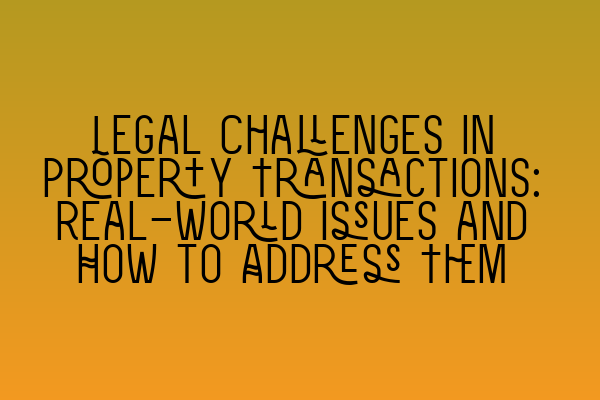Legal Challenges in Property Transactions: Real-World Issues and How to Address Them
When it comes to property transactions, there are a myriad of legal challenges that can arise, potentially derailing the process and causing unnecessary stress for all parties involved. From issues related to contracts and misrepresentation to complex land law matters, it is crucial for solicitors and legal professionals to be well-versed in handling these challenges effectively. In this blog post, we will explore some of the most common legal challenges in property transactions and provide valuable insights on how to address them.
1. Contracts and Ethics in Property Law
Contracts form the foundation of any property transaction, outlining the rights, obligations, and responsibilities of both the buyer and seller. However, ethical considerations also play a significant role in property law, as the actions and decisions made can have far-reaching consequences. It is important for solicitors to navigate both the moral and legal dimensions of contracts, ensuring that all parties are treated fairly and the transaction is conducted ethically. To delve deeper into this topic, you can refer to our article on Ethics in Contract Law: Navigating the Moral and Legal Dimensions.
2. Misrepresentation and Deceptive Practices
Misrepresentation can occur when false statements or actions are made by one party to induce another party into entering a contract. In property transactions, misrepresentation can take many forms, from concealing information about defects in the property to providing inaccurate financial information. It is essential for solicitors to be vigilant in identifying and addressing any deceptive practices, ensuring that their clients are not misled. To gain further insights into misrepresentation in contracts, you can read our informative article on Misrepresentation in Contracts: Unveiling Deceptive Practices.
3. Complex Land Law Matters
Land law is a complex area that can present numerous challenges in property transactions. From rights of way and boundary disputes to restrictive covenants and easements, understanding and navigating the intricacies of land law is essential to ensure a smooth transaction. Solicitors need to have a comprehensive understanding of the intricacies of land law, including influential judicial decisions and the finer details of the SQE Contract Law syllabus. To gain a deeper understanding of land law and its implications in property transactions, you can refer to our article on A Closer Look at SQE Contract Law Syllabus and SQE Contract Law: Analyzing Landmark Cases and Influential Judicial Decisions.
4. Key Considerations and Best Practices in Property Transactions
When it comes to property transactions, there are several key considerations and best practices that solicitors must keep in mind. These include conducting thorough due diligence, ensuring compliance with zoning and planning regulations, and addressing any potential issues with the property title. In addition, solicitors need to be well-versed in contract law for services, ensuring that the terms and conditions of any service contracts related to the property are properly drafted and negotiated. To gain a deeper understanding of contract law for services and best practices in property transactions, you can refer to our article on Contract Law for Services: Key Considerations and Best Practices.
In conclusion, property transactions often present a range of legal challenges that require expertise and careful consideration. By staying informed about the latest developments in property law, being vigilant about ethical considerations, and employing best practices, solicitors and legal professionals can effectively address these challenges and ensure a successful outcome for their clients.
